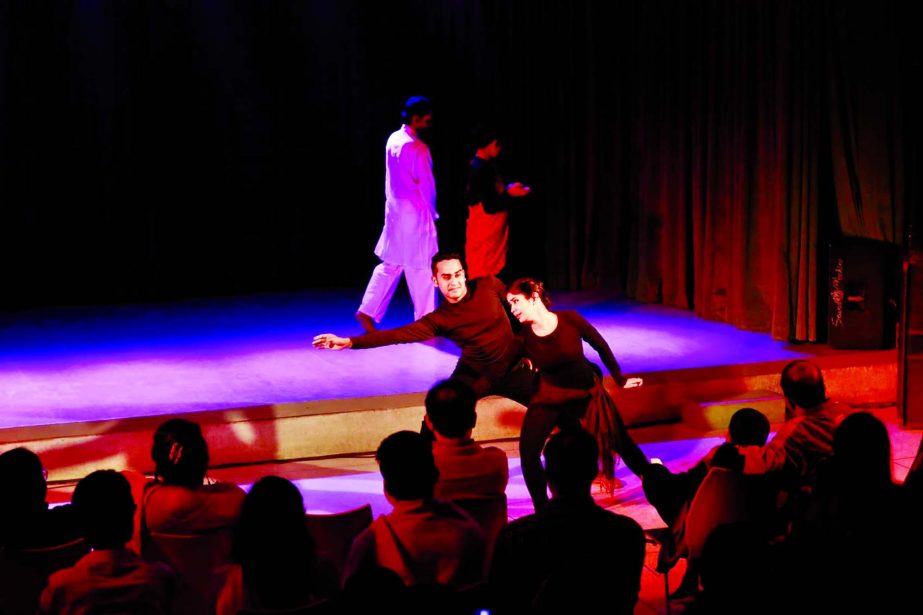
Sheikh Arif Bulbon :
A magnificent dance and theater
presentation, choreographed by
promising choreographer and dancer Snata Shahrin depicting the 1947
partition stories staged at the
auditorium of Goethe-Institut Bangladesh in the city’s Dhanmondi
area recently.
The full house audience enjoyed the 20 minutes long show at a pinpoint silence, where most people could relate their emotions and sense of belonging despite living in Bangladesh, part of
formerly undivided Bengal.
A group of eight actors and four dancers staged the show composed
by a fine blending of theatrical play and contemporary dance on the topic
of 1947 partition of Bengal.
Their story developed upon the
inter-religious bonding that people of Bengal have had years before the
partition. They also portrayed the
misbelieves and misunderstandings, which was created due to the ‘divide and rule’ theory initiated by the then colonial power that eventually broke the peaceful intra-religious ties back in those days. Each of the ups and downs of people’s life and history during then was described through choreographed
performances including a traditional Laathi Khela on stage.
The whole act was put together by
talented young choreographer and dancer Snata Shahrin with the assistance of another versatile choreographer Tahnun Ahmedy. For them, it was
a good opportunity to display mass people the actuality of dance theatre. With their dialogues and body
movements, they tried to narrate the history, inner feelings of the victims
of partition, the riots and the feelings that we still carry within.
The performance was the part of
a presentation project called Meiner Eltern Welt (My Parents’ World) Inherited Memories. This project is mainly an oral history project based on interviewing 3rd Generation of the 1947 partition survivor living in Bangladesh and India. It was initiated in August 2015 by the
Goethe-Institut Bangladesh and the Goethe-Institut Kolkata, in collaboration with the Heidelberg University, Centre for Studies in Social Sciences, Kolkata and Research Initiatives Bangladesh.
A magnificent dance and theater
presentation, choreographed by
promising choreographer and dancer Snata Shahrin depicting the 1947
partition stories staged at the
auditorium of Goethe-Institut Bangladesh in the city’s Dhanmondi
area recently.
The full house audience enjoyed the 20 minutes long show at a pinpoint silence, where most people could relate their emotions and sense of belonging despite living in Bangladesh, part of
formerly undivided Bengal.
A group of eight actors and four dancers staged the show composed
by a fine blending of theatrical play and contemporary dance on the topic
of 1947 partition of Bengal.
Their story developed upon the
inter-religious bonding that people of Bengal have had years before the
partition. They also portrayed the
misbelieves and misunderstandings, which was created due to the ‘divide and rule’ theory initiated by the then colonial power that eventually broke the peaceful intra-religious ties back in those days. Each of the ups and downs of people’s life and history during then was described through choreographed
performances including a traditional Laathi Khela on stage.
The whole act was put together by
talented young choreographer and dancer Snata Shahrin with the assistance of another versatile choreographer Tahnun Ahmedy. For them, it was
a good opportunity to display mass people the actuality of dance theatre. With their dialogues and body
movements, they tried to narrate the history, inner feelings of the victims
of partition, the riots and the feelings that we still carry within.
The performance was the part of
a presentation project called Meiner Eltern Welt (My Parents’ World) Inherited Memories. This project is mainly an oral history project based on interviewing 3rd Generation of the 1947 partition survivor living in Bangladesh and India. It was initiated in August 2015 by the
Goethe-Institut Bangladesh and the Goethe-Institut Kolkata, in collaboration with the Heidelberg University, Centre for Studies in Social Sciences, Kolkata and Research Initiatives Bangladesh.

